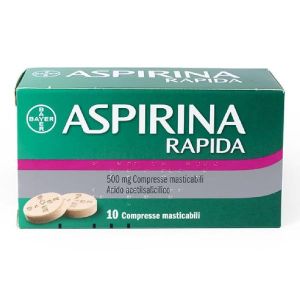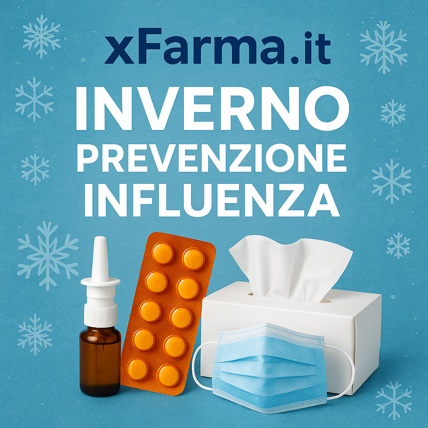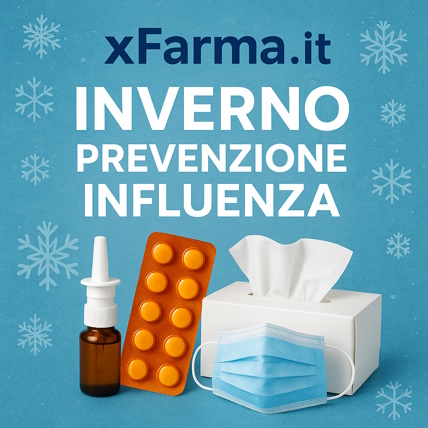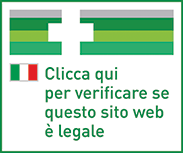Ship in Europe, Find out rates!
Rapid Aspirin 10 chewable tablets 500mg

- box Delivery in Italy in 24/48 and free returns
- star3.000+ positive reviews
- dropboxOver 60,000 products in the catalog
Fast Aspirin Chewable Tablets is used for:
Symptomatic therapy of feverish states and flu and cold syndromes.
Symptomatic treatment of head and tooth pain, neuralgia, menstrual pain, rheumatic and muscular pain.
Dosage and method of use
Rapid Aspirin Chewable Tablets should be taken in a dose of 1 - 2 tablets as a single dose, repeating, if necessary, the dose at intervals of 4-8 hours up to 2 - 3 times a day. The tablet should be chewed with or without the aid of drinks,
The use of the product is reserved for adult patients only. Always use the lowest effective dosage and only increase it if it is not sufficient to relieve symptoms (pain and fever). Do not exceed the recommended doses: in particular elderly patients should follow the minimum dosages indicated above. Those most exposed to the risk of serious side effects, who can use the drug only if prescribed by a doctor, must strictly follow its instructions.
Use the medicine for the shortest period possible. Do not take the product for more than 3 - 5 days without medical advice. See your doctor if symptoms persist.
Take the medicine preferably after main meals or, in any case, on a full stomach
Contraindications
Rapid Aspirin Chewable Tablets is contraindicated in case of:
Hypersensitivity to the active substance (acetylsalicylic acid), to other analgesics (pain relievers) / antipyretics (antipyretics) / non-steroidal anti-inflammatory drugs (NSAIDs) or to any of the excipients
Gastroduodenal ulcer;
Hemorrhagic diathesis;
Severe kidney, heart or liver failure;
Deficit of glucose -6-phosphate dehydrogenase (G6PD / favism);
Concomitant treatment with methotrexate (at doses of 15 mg / week or more) or with warfarin;
History of asthma induced by the administration of salicylates or substances with similar activity, in particular non-steroidal anti-inflammatory drugs;
Third trimester of pregnancy and lactation;
Children and teenagers under the age of 16.
Special warnings
Hypersensitivity reactions
Acetylsalicylic acid and other NSAIDs can cause hypersensitivity reactions (including asthma attacks, rhinitis, angioedema or urticaria). The risk is greater in subjects who have already experienced a hypersensitivity reaction in the past after the use of this type of drug and in subjects who have allergic reactions to other substances (eg skin reactions, itching, hives).
In subjects with asthma and / or rhinitis (with or without nasal polyposis) and / or urticaria, the reactions may be more frequent and severe. In rare cases, the reactions can be very serious and potentially fatal. In the following cases, the administration of the drug requires a doctor's prescription after careful evaluation of the risk / benefit ratio:
Subjects at increased risk of hypersensitivity reactions
Subjects at increased risk of gastrointestinal lesions
Acetylsalicylic acid and other NSAIDs can cause serious gastrointestinal side effects (bleeding, ulcer, perforation). For that reason
these drugs should not be used by people with gastrointestinal ulcer or gastrointestinal bleeding. It is prudent that even those who in the past have suffered from gastrointestinal ulcer or gastrointestinal bleeding avoid its use. The risk of gastrointestinal lesions is a dose related effect, as gastrolysis is greater in subjects who use higher doses of acetylsalicylic acid. Even subjects with a habit of drinking large quantities of alcohol are more exposed to the risk of gastrointestinal lesions (bleeding in particular).
Subjects with coagulation defects or treated with anticoagulants
Acetylsalicylic acid and other NSAIDs can cause a severe reduction in haemostatic capacity in subjects suffering from coagulation defects or being treated with anticoagulants, exposing them to the risk of bleeding.
Subjects with impaired renal or cardiac or hepatic function
Acetylsalicylic acid and other NSAIDs can cause a critical reduction in renal function and water retention; the risk is greater in subjects being treated with diuretics. This can be particularly dangerous for the elderly and for those with impaired kidney or heart or liver function.
People with asthma
Acetylsalicylic acid and other NSAIDs can cause aggravation of asthma.
Geriatric age (especially over 75 years)
The risk of serious side effects is greater in people of geriatric age. People over the age of 70, especially in the presence of concomitant therapies, should only use Aspirin after consulting your doctor. Aspirin should not be used in children and young people under the age of 16.
Subjects with hyperuricemia / gout
Acetylsalicylic acid can interfere with the elimination of uric acid: high doses have a uricosuric effect while (very) low doses can reduce its excretion. It should also be considered that acetylsalicylic acid and other NSAIDs can mask the symptoms of gout by delaying its diagnosis. An antagonistic effect with uricosuric drugs is also possible.
Combination of drugs not recommended or requiring special precautions or dosage adjustment.
Using acetylsalicylic acid in combination with some medications may increase the risk of serious side effects. Do not use acetylsalicylic acid together with another NSAID or, in any case, do not use more than one NSAID at a time.
Fertility
The use of acetylsalicylic acid as well as any drug that inhibits prostaglandin synthesis and cyclooxygenase may interfere with fertility; female subjects must be informed of this and in particular women who have fertility problems or who are undergoing fertility investigations.
Sodium
This medicinal product contains sodium: it may not be suitable for people who must follow a low sodium diet, consult your doctor. If you have to undergo surgery (even a minor one, for example the extraction of a tooth) and in the previous days you have used acetylsalicylic acid or another NSAID, you must inform the surgeon for the possible effects on coagulation .
Since acetylsalicylic acid can cause gastrointestinal bleeding, it must be taken into account in case it is necessary to perform a search for occult blood. Before administering any medicine, all necessary precautions must be taken to prevent unwanted reactions; of particular importance is the exclusion of previous hypersensitivity reactions to this or other medicinal products and the exclusion of other contraindications or conditions that may expose you to risk of potentially serious side effects listed above.
If in doubt consult your doctor or pharmacist. The product must be taken on a full stomach.
Pregnancy and breastfeeding
Pregnancy
Inhibition of prostaglandin synthesis can adversely affect pregnancy and / or embryo / fetal development. Results of epidemiological studies suggest an increased risk of miscarriage and cardiac malformation and gastroschisis after use of a prostaglandin synthesis inhibitor in early pregnancy. The absolute risk of cardiac malformations was increased from less than 1% to approximately 1.5%. It has been estimated that the risk increases with dose and duration of therapy.
In animals, administration of prostaglandin synthesis inhibitors has been shown to cause an increase in pre- and post-implantation loss and embryo-fetal mortality. In addition, an increased incidence of various malformations, including cardiovascular, has been reported in animals given prostaglandin synthesis inhibitors during the organogenetic period.
During the first and second trimester of pregnancy, acetylsalicylic acid should not be administered unless clearly needed. If drugs containing acetylsalicylic acid are used by a woman trying to become pregnant, or during the first and second trimester of pregnancy, treatment should be as short as possible and the dose as low as possible. During the third trimester of pregnancy, all prostaglandin synthesis inhibitors can expose the fetus to: cardiopulmonary toxicity (with premature closure of the arterial duct and pulmonary hypertension); renal dysfunction, which can progress to renal failure with oligohydroamnios; The use of Aspirin Rapid Chewable Tablets can expose the mother and the unborn child, at the end of pregnancy, to: possible prolongation of the bleeding time, an antiplatelet effect that can occur even at very low doses; inhibition of uterine contractions resulting in delayed or prolonged labor.
Consequently, acetylsalicylic acid is contraindicated during the third trimester of pregnancy
Feeding time
Rapid Aspirin Chewable Tablets is contraindicated during breastfeeding
Expiration and retention
The expiry date refers to the product in intact packaging, correctly stored. Keep this medicine out of the reach and sight of children. Store at a temperature below 30 ° C.
Warning: do not use the medicine after the expiry date indicated on the package.
Composition
Rapid Aspirin Chewable Tablets contains, for each sachet:
Active ingredients: acetylsalicylic acid 500 mg
Excipients: calcium stearate, corn starch, mannitol, sicovit (E110), aspartame, ascorbic acid, anhydrous citric acid, magnesium carbonate, pregelatinised starch, mandarin flavor, orange flavor, sodium carbonate, sodium carboxymethylcellulose, refreshing lemon flavor.
Rapid Aspirin in packs of 10 Chewable Tablets
| Destination | Cost | Detail |
|---|---|---|
| Italy | €5,00* | 72H |
| Austria, France, Germany, Slovenia | € 13* | 3 days |
| Belgium, Luxembourg, Portugal, Netherlands, Spain | € 14* | 4 days |
| Bulgary, Cechia, Hungary, Poland, Romania, Slovakia | € 19* | 5 days |
| Denmark, Estonia, Finland, Ireland, Lithuania, Latvia ,Sweden | € 22* | 5 days |
| United Kingdom, Switzerland, Greece, Malta/td> | € 30* | 7 days |
| Canada | € 40 | 7 Days |
European shipments with express courier: FedEx, MBE, DHL
*For the shipment outside band B ther's an extra cost of 22€ *For the shipment outside band C ther's an extra cost of 30€ Delivery Times exclude Saturday and Holidays
For Islands and Areas of difficult Accessibility the shipments are made in 72 hours and the cost will be increased by 15€


